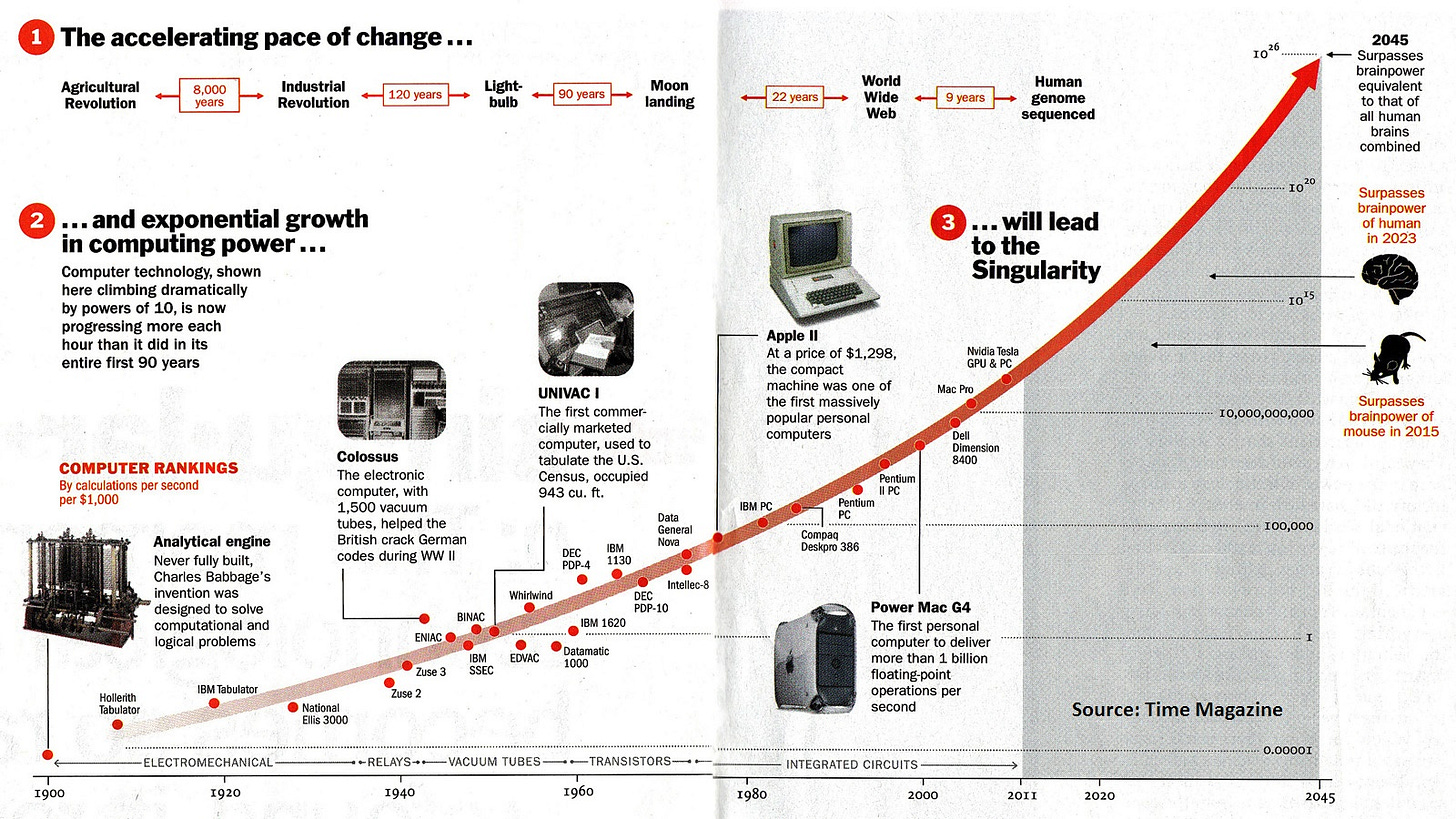Ray Kurzweil's Vision for the Acceleration of Medicine: Digital Twins & AI Drug Trials
Kurzweil thinks AI + "digital twins" rapidly accelerates medicine development (cutting clinical trial times to a fraction of the current norm)
Ray Kurzweil’s books like “The Age of Spiritual Machines” (1999) and “The Singularity is Near” (2004) were enjoyable reads back in the early 2000s but seemed a bit like far-fetched bullshit.
Although Ray hasn’t always been accurate with his predictions and timelines, I give him credit for having the guts to go on record and continue making them. He has been accurate on AI’s recent trajectory (AGI predictions) that many failed to see coming (some thought GPT-3 was a sign that AI was hitting a wall).
Select individuals in tech/AI spheres publicly apologized to Ray in 2024 for blatantly dismissing his AGI prediction as magical thinking hogwash. The reality is that Ray’s a smart guy and although he’s not always right, his thoughts are worth entertaining.
Some people get a bit too “hyped” about the future after listening to some of what he predicts/says and perhaps he is a bit optimistic with certain timelines, but he’s generally directionally accurate.
Ray appeared on the Joe Rogan Experience (#2117) in March 2024 and the conversation was a bit awkward with bouts of clear disconnect between Ray and Joe. Ray seemed a bit mentally sluggish and Joe grilled him on topics that weren’t really in his wheelhouse.
At one point Kurzweil discussed how he thinks AI will rapidly accelerate drug/medicine development by replacing human clinical trials (that would take years or decades) with digital simulations.
My reaction? WTF. Didn’t really make sense to me because I couldn’t wrap my head around what he was suggesting. I wondered if this was even plausible even if we assume continued progress of AI/ML.
His idea was that humans will leverage AI to develop ultra-detailed “simulations” of the human body called “digital twins” that will be so precise, they can fully replace human test subjects (and negate the need for animal testing).
Instead of testing a new compound, molecule, drug, treatment in human clinical trials like we currently do — you’d just feed the specific chemical/molecule to the AI where they run simulations on human digital twins (and it determines whether the chemical/molecule is safe and effective)… this whole process would take perhaps months, weeks, days, or hours (depending on how advanced AI is and how much data we have).
Congrats… you’ve completed a clinical trial in 5 minutes that would’ve taken decades (or at least that’s the general concept).
Basic information on time/costs to bring new medical treatments to market:
Development of new drugs typically takes ~12 years (from initial discovery to market launch) (LINK)
In newer niches like gene therapy, this timeline can extend up to ~30 years
The mean cost of brining a new drug to market is ~$879.3 million (when accounting for both development failures and capital costs) — with a range between ~378.7 million to ~$1.756 billion. (LINK)
Only about 1 in 5000 new compounds successfully achieve regulatory approval as pharmaceutical drugs
Kurzweil’s “Law of Accelerating Returns”

Ray Kurzweil is famous for predicting the explosive progression of technology via what he calls the Law of Accelerating Returns.
This principle states that once a technology (especially computation) becomes capable of improving itself, breakthroughs build on each other at an exponential pace.
During his appearance on The Joe Rogan Experience, Kurzweil applied this reasoning to medicine, asserting that AI-driven research could drastically speed up how we discover, test, and approve drugs—eventually reaching a level where the vast majority of human testing is replaced by computer simulations.
Specific Dates Mentioned by Kurzweil:
2029: AI matches (and likely exceeds) human intelligence.
2030s (Mid to Late): Rapid advances in AI-based drug testing, “digital twins,” and the possibility of outpacing traditional clinical trials.
2045: The “Singularity,” a point at which AI-based intelligence expands so dramatically that nearly all current human tasks (including lengthy drug approvals) are transformed or rendered unrecognizable.
Kurzweil’s confidence stems from historical trends in computation—and from how tools like large language models are already exceeding public expectations.
mRNA Vaccines to “Digital Twins”
On Rogan’s podcast, Kurzweil drew parallels between existing in silico processes, such as the speedy design of mRNA vaccine candidates, and his future vision of full-scale “digital twin” trials.
Keep reading with a 7-day free trial
Subscribe to ASAP Drew to keep reading this post and get 7 days of free access to the full post archives.




